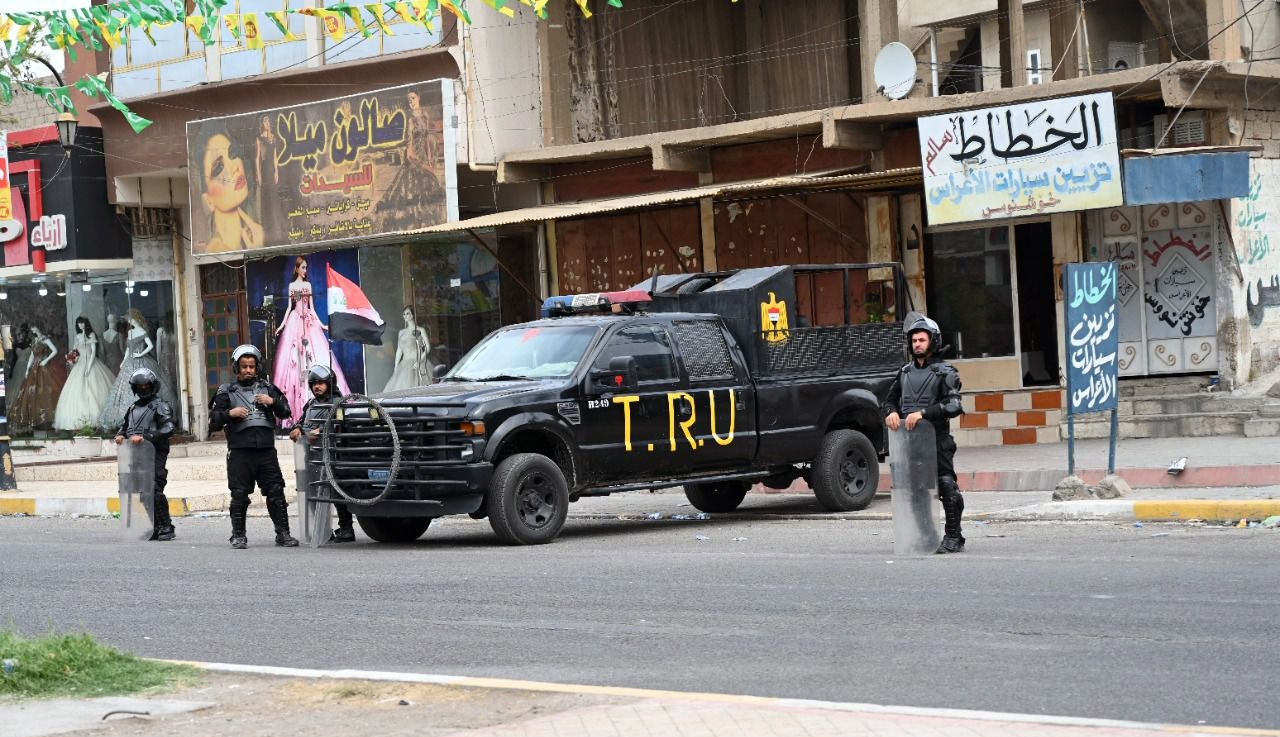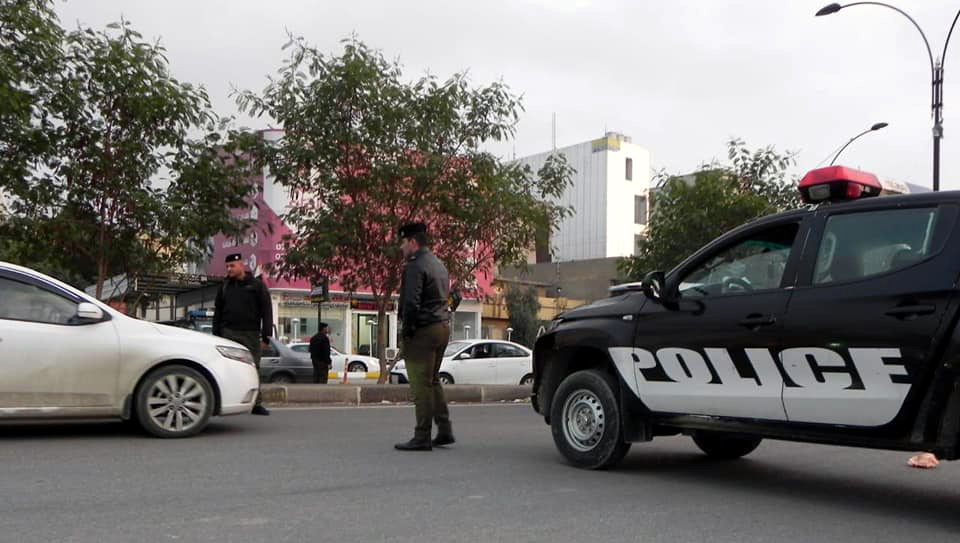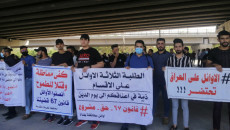Before getting University degree, Taraf Mahmud had a desire to take up arms in the police ranks. Four years passed yet he has not given up on his desire and is impatiently waiting to be enrolled as a policeman.
Late 2017, Mahmud was among hundreds of Kirkuk's undergraduates, most of whom then were students, who filled out electronic forms for appointments by the security forces. The majority prepared required documentation in order to be able to participate in the trainings and finally to be hired as policemen.
"Four years have passed since then, but we are still waiting for the directives and appointments to be issued. So far, we have not received any response, and the process has remained suspended," Mahmud told KirkukNow.
During the past four years, those young men applied for appointment by police went out in many demonstrations and protest gatherings in Kirkuk and the capital Baghdad, the last one was in October 2021, yet all in vain.
"We knocked on the doors of all officials and members of the parliament. They made use of us during the electoral campaign period and later they told us there was no sufficient budget for appointment," said Mahmud, only 27.
They made use of us during the electoral campaign period and later they told us there was no sufficient budget for appointment
Mahmud has graduated from the Department of Arabic Language at the Faculty of Arts, the University of Kirkuk in 2018, and is currently working as a daily paid laborer but still doesn't want to give up the idea of joining the police.
Mahmud said some of his colleagues quit their education at the time, willing to be appointed by the police force but after that their efforts failed, they were unable to return to university.
“The Ministry of Interior decided to give priority to the appointment to personnel left the security service or were expelled during the attacks by ISIS in 2014, even though we spent four years of our life hoping for appointment,” Mahmud added.
Kirkuk, Iraq’s second largest reserves, located 238 kilometers north of Baghdad, is an ethnically mixed province for 1.2 million Kurds, Sunni and Shiite Arabs, and Turkmen. It has long been at the center of disputes between Baghdad and the Erbil.
Four years ago, the Iraqi Ministry of Interior published an electronic link for those wishing to join the police, and after filling out the special form, the names of the applicants returned within two months and were summoned to undergo a medical and physical examination in Baghdad, after completing the necessary transactions and obtaining security permits, it was decided to summon them for training and employment yet it has been suspended since then.
Arshad al-Salihi, MP of Kirkuk province in the fourth session of the Iraqi parliament, said in a statement last August after meeting with representatives of young men who wished to join the police force, “If the ministry does not need these young men, why did you ask them to fill out application forms and carry out appointment procedures then ignored them after that?"
"Officials in the Ministry of Interior should be held accountable for this file, so that they know that they do not have the right to play with the feelings of others," Salihi said.
Al-Salihi pointed out that they made efforts through Parliament regarding the issue of appointments but the Ministry of Interior did not issue direct orders to the applicants on the pretext that the Ministry of Finance did not allocate a budget.
The International labor Organization ILO said unemployment rate in Iraq has jumped from 9% early 1990s into 13% in 2020 while employment is 35.5%.
Out of 40 million Iraqis, 9.2 million are employed while Iraq's state-dominated economy is led by the oil sector, which provides approximately 85 percent of government revenue. The government pays 400% more in salaries than it did 15 years ago. Around three quarters of the state’s expenditures in 2020 went to paying civil servants of the public sector.
Video: Kirkuk, October 2021- A demonstration of young men applying for employment as police
The conditions required to join the police force within the Ministry of Interior are the applicant must be between 18 and 35 years old, height not less than 167 centimeters, and must pass medical tests, eyesight and physical fitness tests.
Muayyad al-Musawi, a young man from the city of Kirkuk, graduated from the administration department at the Technical Institute and completed in 2017 the procedures for appointment by the police force but he was not required to join the security service and did not have a job opportunity in the field he graduated from.
"The young men of Kirkuk are the only ones who still employment admin orders and appointments, unlike the young men of other Iraqi provinces who provided paperwork in conjunction with us and were appointed," said Muayyad.
According to KirkukNow follow-ups, in Diyala and Salah al-Din appointment orders were issued to more than half of the applicants while no one was appointed in Kirkuk.
The young men of Kirkuk are the only ones who were not enrolled and employed.
"Last month, we organized a demonstration in Baghdad in front of the Ministry of Interior building. We wanted to meet the Minister of Interior, but we met with the Undersecretary of the Ministry, Hussein Al-Awadi, who sent a letter to the Prime Minister to approve our request," said Al-Moussawi.
The letter, which was addressed to the Iraqi Prime Minister, Mustafa Al-Kadhimi, included a request to address the Ministry of the Interior in order to allocate a budget for the purpose of appointing applicants who completed the procedures for joining the police in 2017, at a time when the Ministry needs to appoint 64,000 people to fill vacancies in the forces affiliated with the Ministry of Interior, since many have retired, passed away or left the service during the past years.
"We waited a long time in front of the ministry building, until the undersecretary told us that the prime minister had given his approval. We then went back to our homes, but we did not see any result since then and our appointments have not seen the light," Al-Moussawi said.
Last year, Othman Al-Ghanimi, Minister of Interior, said in a statement that the ministry would make serious efforts with members of the Parliamentary Security and Defense Committee in order to find an appropriate solution to the problem of people who submitted appointments between 2017 and 2018, but neither the minister nor the Parliamentary Committee has since revealed the results for the case.
According to KirkukNow follow-up, more than 1,200 young men from Kirkuk since 2017 submitted applications for appointment to the police force and have completed their documentation. During those four years, some of them went to work in other places or were appointed to the civil service, such as the education corps, but most of them are still waiting to be appointed by the Ministry of Interior.
"The Kirkuk Police Command sent several official letters to the Ministry of Interior regarding the issue of young men who applied for appointment in order to fill the void in Kirkuk police," said a security source in the Ministry of Interior, yet their efforts led to no tangible results.
The source explained that the issue is not only related to the Ministry of Interior, but that there are other ministries that need staff, but the process is related to budget allocation by the Ministry of Finance for the salaries of the new recruits.

Kirkuk, 2021: A unit of Kirkuk Police Command in Al-Shorja neighborhood. Police Media
The last appointments for Kirkuk police force was in 2012 when 900 policemen were appointed from Kirkuk's different nationalities and components.
Al-Musawi says that there are graduates of engineering degrees among them, but they are waiting for employtment by the police force, some of them have wives and children and are going through difficult living conditions.
"A large group of young people are being ignored by the government. Among us there are young men who are just engaged and are waiting for employment to hold their wedding."
"We have even suggested to the Kirkuk administration in one of the meetings that applicants who completed their documentation to be enrolled without payment until budget is allocated."
Al-Moussawi says they have received the same treatment in 2014 and 2015 while requesting employment by the civil defense for several years despite the fact that the police leadership needs to appoint new members.
Kirkuk Police Command has lost a large number of its members since 2003
According to official statistics obtained by KirkukNow, the Kirkuk Police Command has 11,000 members, in addition to hundreds of traffic police, intelligence and nationality police who are directly affiliated with the Ministry of Interior.
A source in the Ministry of the Interior said the number of Kirkuk police personnel is insufficient compared to Nineveh province (22,000 members) and Salah al-Din province (16,000 members), while the population of Kirkuk and Salah al-Din provinces are close, with a population of more than one 1.6 million people.
"The Kirkuk Police Command has lost a large number of its members since 2003, due to injury, martyrdom or retirement," the source explained.
According to the statistics given by the Kirkuk Police Command to KirkukNow, during the past 18 years, more than 722 policemen were martyred 1,200 others were injured and retired while more than 800 policemen who were injured are still on duty.






